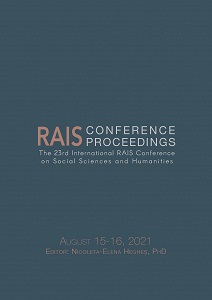Healthcare Dependent Multiplier
Healthcare Dependent Multiplier
Author(s): Julia M. Puaschunder
Subject(s): Health and medicine and law, Economic development
Published by: Scientia Moralitas Research Institute
Keywords: Austerity; Coronavirus; Corruption; COVID-19; Digitalization
Summary/Abstract: The currently ongoing COVID-19 crisis has challenged healthcare around the world. The call for global solutions in international healthcare pandemic outbreak monitoring and crisis risk management has reached unprecedented momentum. The novel coronavirus SARS-CoV-2 imposes the most unexpected external economic shock to modern humankind, triggering abrupt consumption and behavior pattern shifts around the world with widespread socio-economic impacts. In order to alleviate unexpected negative fallouts from the crisis, governments around the world have incepted the largest ever amount of strategic economic bailout rescue and recovery packages that particularly focus on economic and social targets. The potential focus of bailouts and recovery ranges from urban-local and national to even global and future-oriented beneficiaries, as pursued in public investments on climate stabilization in the United States Green New Deal or the European Green Deal Sustainable Finance Taxonomy. Large-scale and future-oriented governmental investments are valuable macroeconomic multipliers that can benefit society as a whole in the short run and long term. Economic multipliers trickle down positively in society since governmental spending incepting projects leads to increased salaries, opportunities to support a family and employ other people in the consumption of goods and services, to name a few economic multiplying growth opportunities in the wake of governmental spending. This paper proposes the idea that multiplier effects may vary based on the causes that receive governmental funding. Evidence of country differences in multiplier effectiveness already exist. Multipliers also appear to trickle down in society with a certain time lag. Lastly, multiplier effects can also be negative if the government chooses to cut spending during austerity measures. The discussion proposes potential future hypothesis testing opportunities for investigating healthcare dependent multipliers. Given the enormous amount of governmental COVID rescue and recovery aid in the aftermath of the COVID-19 crisis and the blatant importance of health in the eye of the pandemic, the time has come to investigate if there is a certain effect of governmental spending on healthcare that influences the multiplier. In order to understand a potential multiplier effect of governmental spending on healthcare, a healthcare dependent multiplier effect could test if healthcare related governmental spending leads to a higher or lower than 1.6 multiplying factor. If a relation between multiplier effects and healthcare exists, a future step would be to investigate if it also holds or varies for particular governmental investment in prevention and preventive healthcare. If there are effects for governmental spending on healthcare, well-being and social welfare are potential moderators of the effect. In the 21st century, healthcare is directly related to digitalization and technological advancement, which could be other moderators to control for. Lastly, corruption has been found to be negatively related to quality healthcare and may also be accounted for in future healthcare related multiplier investigations. The paper ends with an outlook on policy implications of the prospective envisioned research.
Book: Proceedings of the 23rd International RAIS Conference on Social Sciences and Humanities
- Page Range: 211-218
- Page Count: 8
- Publication Year: 2021
- Language: English
- Content File-PDF

